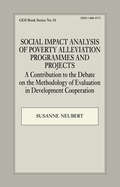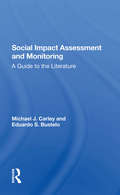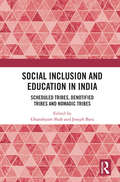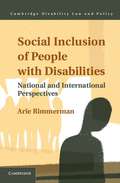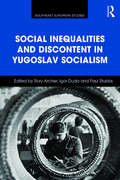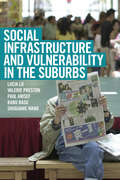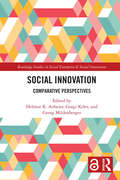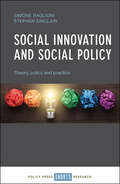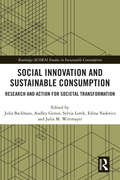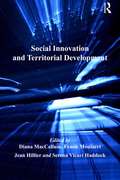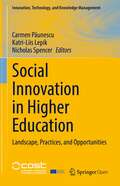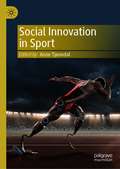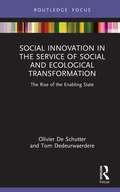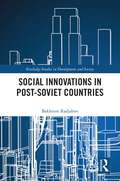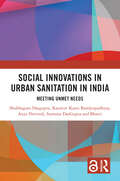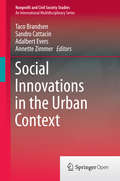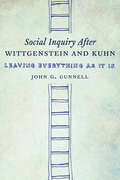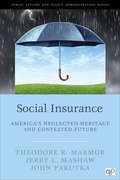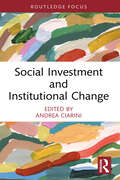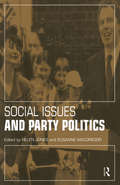- Table View
- List View
Social Impact Analysis of Poverty Alleviation Programmes and Projects: A Contribution to the Debate on the Methodology of Evaluation in Development Co-operation
by Susanne NeubertThis study of the impact of poverty alleviation programmes considers the state of research on evaluation including the social dimension and the methodology; illustrates the evolution of evaluation in the field of development co-operation; and shows successful and inadequate analyzing methods.
Social Impact Assessment And Monitoring: A Guide To The Literature
by Michael J Carley Eduardo BusteloThis systematic, critical review of more than 600 recent publications in social impact assessment (SIA) and related fields is based on the authors' belief that SIA is more than an analytical technique--it is also a logical and timely response to our ever-growing need for more and better information to facilitate decision making in an increasingly c
Social Inclusion and Education in India: Scheduled Tribes, Denotified Tribes and Nomadic Tribes
by Ghanshyam Shah Joseph BaraThis book examines social inclusion in the education sector in India for scheduled tribes (ST), denotified tribes and nomadic tribes. It investigates the gaps between what was promised to the marginalized sections in the constitution, and what has since been delivered. The volume:• Examines data from across the Indian states on ST and non-ST students in higher, primary and secondary education;• Analyses the success and failures of education policy at the central and state level;• Brings to the fore colonial roots of social exclusion in education. A major study, the volume will be of great interest to scholars and researchers of education, sociology and social anthropology, development studies and South Asian studies.
Social Inclusion of People with Disabilities
by Arie RimmermanSocial inclusion is often used interchangeably with the terms social cohesion, social integration and social participation, positioning social exclusion as the opposite. The latter is a contested term that refers to a wide range of phenomena and processes related to poverty and deprivation, but it is also used in relation to marginalised people and places. This book consists of two parts: the first aims to review the domestic and international historical roots and the conceptual base of disability, as well as the expressions of social exclusion of people with disabilities that interfere in their efforts to exercise their rights in society. It offers a comprehensive review of social and legal approaches to social exclusion and inclusion. The second part introduces and analyses domestic and international social and legal strategies to promote social inclusion for people with disabilities.
Social Inequalities and Discontent in Yugoslav Socialism (Southeast European Studies)
by Paul Stubbs Rory Archer Igor DudaSocialist countries like Yugoslavia garnered legitimacy through appealing to social equality. Yet social stratification was characteristic of Yugoslav society and increased over the course of the state's existence. By the 1980s the country was divided on socio-economic as well as national lines. Through case studies from a range of social millieux, contributors to this volume seek to 'bring class back in' to Yugoslav historiography, exploring how theorisations of social class informed the politics and policies of social mobility and conversely, how societal or grassroots understandings of class have influenced politics and policy. Rather than focusing on regional differentiation between Yugoslav republics and provinces the emphasis is placed on social differentiation and discontent within particular communities. The contributing authors of these historical studies come from diverse disciplinary backgrounds, linking scholarship from the socialist era to contemporary research based on accessing newly available primary sources. Voices of a wide spectrum of informants are included in the volume; from factory workers and subsistence farmers to fictional television characters and pop-folk music superstars.
Social Inequality and Human Security: Case Studies from Asia (Routledge Frontiers of Political Economy)
by Christian PlobergerThis book collates case studies of national and subnational efforts to alleviate inequality and implement development and security policy more effectively, collaboratively, and multidimensionally.While inequality is a fundamental developmental challenge and a global phenomenon, responsibility largely falls to the state to address it. This book seeks to provide a specific framework to analyse these efforts at the national and sub-national levels. It does so through the United Nations’ concept of Human Security, whose five core principles provide a good means of addressing inequality’s various facets. Each chapter opens by highlighting the specific aspect of human security that is being addressed. Specific issues covered in the volume include local economic development, maritime economies, fishing communities, governance, and public administration.This book will be of keen interest to scholars of development studies, inequality (especially social inequality), and area studies.
Social Infrastructure and Vulnerability in the Suburbs
by Valerie Preston Paul Anisef Lucia Lo Shuguang Wang Ranu BasuSocial Infrastructure and Vulnerability in the Suburbs examines how the combination of the low-density, car-centric geography of outer suburbs and neoliberal governance in the past several decades has affected disadvantaged populations in North American metro areas. Taking the example of York Region, a large outer suburb north of Toronto, the authors provide a spatial analysis that illuminates the invisible geography of vulnerability in the region.The volume examines access to social services by vulnerable groups who are not usually associated with the suburbs: recent immigrants, seniors, and low-income families. Investigating their access to four types of social infrastructure - education, employment, housing, and settlement services - this book presents a range of policy recommendations for how to address the social inequalities that characterize contemporary outer suburbs.
Social Innovation [Open Access]: Comparative Perspectives (Routledge Studies in Social Enterprise & Social Innovation)
by Helmut Anheier Gorgi Krlev Georg MildenbergerSocial Innovation: Comparative Perspectives investigates socio-economic impact. Since it is hard to establish causality and to measure social properties when investigating impact, especially at the level of society, the book narrows down impact to one priority aspect: social innovation – understood as organizations’ capacity to generate novel ideas, ways and means of doing things, of addressing public and social problems of many kinds. This volume’s primary assertion is that the Third Sector, specifically through stimulating civic involvement, is best placed to produce social innovation, outperforming business firms and state agencies in this regard. By investigating actor contributions to social innovation across seven fields of activity, Social innovation: Comparative Perspectives develops our understanding of why and how the Third Sector is central to functioning, cohesive and viable societies. This volume is based on contributions of the project "ITSSOIN – Impact of the Third Sector as Social Innovation" funded by the European Commission under the 7th framework programme. It will be of insight across disciplines, in particular to the growing social innovation community, innovation researchers more generally and to non-profit scholars. The practical relevance of the book will be of interest to European and national policy makers and practitioners across different sectors.
Social Innovation and Social Policy: Theory, Policy and Practice
by Simone Baglioni Stephen SinclairSocial innovation has become a prominent theme in discussions of social policy reform across the world. This book examines why social innovation is important to social policy analysis. It discusses the theoretical and policy context of this concept; its origin and background; why it has emerged to prominence in recent years and how it has been applied. The book relates social innovation to key debates and issues in social policy. These include competing agency and structural explanations of and solutions to social problems; the relative efficacy of government and civil society initiatives, and the capacity of community and/or service user-led responses to address social problems. The book will be a valuable resource for a wide, international readership including social and public policy analysts, policy makers, practitioners and students.
Social Innovation and Sustainable Consumption: Research and Action for Societal Transformation (Routledge-SCORAI Studies in Sustainable Consumption)
by Audley Genus Sylvia Lorek Julia Backhaus Edina Vadovics Julia M WittmayerThis book showcases strategic policies for and processes of societal transformation, which are required to address the challenge of sustainability. Based on the latest thinking at the interface of social innovation, sustainable consumption and the transformation of society, the book provides: in-depth discussions at the nexus of sustainable consumption, social innovation and social transformation, highlighting their significance to sustainability-related policy and practice; detailed case studies of social innovation in energy, food, housing and policy which illustrate emerging practice and promising policy, business and civil society interventions; and critical reflections and commentaries on the contribution of social innovation to societal transformation. Bringing together aspiring scholars and leading thinkers on this topic, this book leads to compelling new insights for an international audience into the potential of social innovation for sustainable consumption and the transformation of society. It will be of great interest to students and scholars of sustainable consumption, sustainable development, (social) innovation studies and environmental sociology.
Social Innovation and Territorial Development
by Diana MacCallum Serena Vicari HaddockThe concept of social innovation offers an alternative perspective on development and territorial transformation, one which foregrounds innovation in social relations. This volume presents a broad-ranging and insightful exploration of social innovation and how it can affect life, society and economy, especially within local communities. It addresses key questions about the nature of social innovation as a process and a strategy and explores what opportunities may exist, or may be generated, for social innovation to nourish human development. It puts forward alternative development options which variously highlight solidarity, co-operation, cultural-artistic endeavour and diversity. In doing so, this book offers a provocative response to the predominant neoliberal economic vision of spatial, economic and social change.
Social Innovation in Higher Education: Landscape, Practices, and Opportunities (Innovation, Technology, and Knowledge Management)
by Carmen Păunescu Katri-Liis Lepik Nicholas SpencerThis open access book offers unique and novel views on the social innovation landscape, tools, practices, pedagogies, and research in the context of higher education. International, multi-disciplinary academics and industry leaders present new developments, research evidence, and practice expertise on social innovation in higher education institutions (HEIs), across academic and professional disciplines.The book includes a selected set of peer-reviewed chapters presenting different perspectives against which relevant actors can identify and analyse social innovation in HEIs. The volume demonstrates how HEIs can respond to societal challenges, support positive social change, and contribute to the development of international public policy discourse. It answers the question ‘how does the present higher education system, in different countries, promote social innovation and create social change and impact’. In answering this question, the book identifies factors driving success as well as obstacles. Furthermore, it examines how higher education innovation assists societal challenges and investigates the benefits of effective social innovation engagement by HEIs.The interdisciplinary approach of the volume makes it a must-read for scholars, students, policy-makers, and practitioners of economics, education, business and management, political science, and sociology interested in a better understanding of social innovation.
Social Innovation in Sport
by Anne TjønndalThis book provides fresh insights on how social innovations are utilized as strategies to make sport more accessible and inclusive. It does so by bringing together theoretical insights and empirical studies from Norway, Sweden, Denmark, the United States, Australia, Turkey and Belgium. Within the overarching topic of social innovation in sport, this book covers contemporary themes such as digitalization, urban planning, gender equality and innovation in sport policy and practice. It will be of interest to researchers and students in the fields of sociology of sport, sport management, sport science and sociology.
Social Innovation in the Service of Social and Ecological Transformation: The Rise of the Enabling State (Routledge Focus on Environment and Sustainability)
by Tom Dedeurwaerdere Olivier De SchutterThis book explores how the State can play a role as an enabler of citizens-led social innovations, to accelerate the shift to sustainable and socially just lifestyles. To meet the twin challenges of environmental degradation and the rise of inequalities, societal transformation is urgent. Most theories of social change focus either on the role of the State, on the magic of the market, or on the power of technological innovation. This book explores instead how local communities, given the freedom to experiment, can design solutions that can have a transformative impact. Change cannot rely only on central ordering by government, nor on corporations suddenly acting as responsible citizens. Societal transformation, at the speed and scope required, also should be based on the reconstitution of social capital, and on new forms of democracy emerging from collective action at the local level. The State matters of course, for the provision of both public services and of social protection, and to discipline the market, but it should also act as an enabler of citizen-led experimentation, and it should set up an institutional apparatus to ensure that collective learning spreads across jurisdictions. Corporations themselves can ensure that society taps the full potential of citizens-led social innovations: they can put their know-how, their access to finance, and their control of logistical chains in the service of such innovations, rather than focusing on shaping consumers’ tastes or even adapting to consumers’ shifting expectations. With this aim in mind, this book provides empirical evidence of how social innovations, typically developed within "niches", initially at a relatively small scale, can have society-wide impacts. It also examines the nature of the activism deployed by social innovators, and the emergence of a "do-it-yourself" form of democracy. This book will appeal to all those interested in driving societal change and social innovation to ensure a sustainable and socially just future for all.
Social Innovations in Post-Soviet Countries (Routledge Studies in Development and Society)
by Bakhrom RadjabovThis book evaluates the evolution of social innovation in post-Soviet Central Asia, Eastern Europe and Caucasus. Following the dissolution of the USSR, organisations such as the UNDP have encouraged local communities and governments to innovate in order to find solutions to existing social problems. This book demonstrates that progress with social innovations has varied, with countries with low government support such as Uzbekistan struggling, whereas countries with better government support and a more active civil society, such as Armenia and Ukraine, have seen more positive results. Covering the period 2012-2020 and a broad range of countries, including Kazakhstan, Kyrgyzstan, Tajikistan and Uzbekistan, Moldova, Ukraine, Azerbaijan, Armenia, and Georgia, this book provides an impressively broad-ranging critical analysis of post-Soviet social innovation. Including social innovations emerging as a result of the Covid-19 outbreak, this will be an important comparative study for researchers and practitioners working on social innovation, and to those with an interest in post-Soviet development.
Social Innovations in Urban Sanitation in India: Meeting Unmet Needs
by Shubhagato Dasgupta Kaustuv Kanti Bandyopadhyay Anju Dwivedi Sumona Das Gupta Ms BhartiThis book discusses effective social innovation strategies facilitated by civil society organisations (CSOs) to tackle India’s significant urban sanitation challenge. It presents the contours of an ecosystem that includes citizen participation and strengthening community-managed systems for improved sanitation and public health. The book analyses case studies of effective sanitation programmes as well as experiments with innovative ideas in different regional contexts by CSOs to meet the contextual needs of the community and to ensure access to safe sanitation, especially among the urban poor. It highlights the challenges and the need for active participation of communities for change in behaviour, increasing institutional capacities of municipalities for standardising and scaling up strategies which work. The authors highlight the need for designing low-cost solutions, organising informal sanitation workers, serving marginalised communities and building effective alliances between communities and institutions to influence public policy. Rich in empirical data, this book will be useful for scholars and researchers of urban studies, public policy, governance, political science, development studies and sociology as well as for CSOs and non-governmental organisations (NGOs) working on urban sanitation, urban planning and public policy.
Social Innovations in the Urban Context
by Taco Brandsen Sandro Cattacin Adalbert Evers Annette ZimmerThis book addresses the practice of social innovation, which is currently very much in the public eye. New ideas and approaches are needed to tackle the severe and wicked problems with which contemporary societies are struggling. Especially in times of economic crisis, social innovation is regarded as one of the crucial elements needed to move forward. Our knowledge of its dynamics has significantly progressed, thanks to an abundance of studies on social innovation both general and sector-specific. However, despite the valuable research conducted over the past years, the systematic analysis of social innovation is still contested and incomplete. The questions asked in the book will be the following: 1. What is the nature of social innovations? 2. What patterns can be identified in social innovations emerging at the local level? 3. How is the emergence and spread of social innovations related to urban governance? More precisely, which conditions and arrangements facilitate and hinders social innovation? We explore these questions using different types of data and methods, and studying different contexts. In particular, we focus on innovations that aim at solving problems of the young unemployed, single parents and migrants. This analysis is based on original research carried out in the period 2010-2013 in the framework of a European project with a specific empirical research strategy. Research was carried out in 20 cities in 10 different European countries.
Social Inquiry After Wittgenstein and Kuhn
by John G. GunnellA distinctive feature of Ludwig Wittgenstein's work after 1930 was his turn to a conception of philosophy as a form of social inquiry, John G. Gunnell argues, and Thomas Kuhn's approach to the philosophy of science exemplified this conception
Social Inquiry After Wittgenstein and Kuhn: Leaving Everything as It Is
by John GunnellA distinctive feature of Ludwig Wittgenstein's work after 1930 was his turn to a conception of philosophy as a form of social inquiry, John G. Gunnell argues, and Thomas Kuhn's approach to the philosophy of science exemplified this conception. In this book, Gunnell shows how these philosophers address foundational issues in the social and human sciences, particularly the vision of social inquiry as an interpretive endeavor and the distinctive cognitive and practical relationship between social inquiry and its subject matter.Gunnell speaks directly to philosophers and practitioners of the social and human sciences. He tackles the demarcation between natural and social science; the nature of social phenomena; the concept and method of interpretation; the relationship between language and thought; the problem of knowledge of other minds; and the character of descriptive and normative judgments about practices that are the object of inquiry. Though Wittgenstein and Kuhn are often criticized as initiating a modern descent into relativism, this book shows that the true effect of their work was to undermine the basic assumptions of contemporary social and human science practice. It also problematized the authority of philosophy and other forms of social inquiry to specify the criteria for judging such matters as truth and justice. When Wittgenstein stated that "philosophy leaves everything as it is," he did not mean that philosophy would be left as it was or that philosophy would have no impact on what it studied, but rather that the activity of inquiry did not, simply by virtue of its performance, transform the object of inquiry.
Social Inquiry and Bayesian Inference: Rethinking Qualitative Research (Strategies for Social Inquiry)
by Tasha Fairfield Andrew E. CharmanFairfield and Charman provide a modern, rigorous and intuitive methodology for case-study research to help social scientists and analysts make better inferences from qualitative evidence. The book develops concrete guidelines for conducting inference to best explanation given incomplete information; no previous exposure to Bayesian analysis or specialized mathematical skills are needed. Topics covered include constructing rival hypotheses that are neither too simple nor overly complex, assessing the inferential weight of evidence, counteracting cognitive biases, selecting cases, and iterating between theory development, data collection, and analysis. Extensive worked examples apply Bayesian guidelines, showcasing both exemplars of intuitive Bayesian reasoning and departures from Bayesian principles in published case studies drawn from process-tracing, comparative, and multimethod research. Beyond improving inference and analytic transparency, an overarching goal of this book is to revalue qualitative research and place it on more equal footing with respect to quantitative and experimental traditions by illustrating that Bayesianism provides a universally applicable inferential framework.
Social Insurance and Economic Security (Prentice-hall Series In Security And Insurance)
by George E. RejdaThis classic social insurance work has been updated to cover a decade of policy developments and the impact of the recent economic crisis.The book includes in-depth discussion of all major programs to reduce economic insecurity in the United States, including Social Security, Medicare, workers' compensation, unemployment compensation, and temporary disability insurance. The principles, characteristics, and policy issues associated with social insurance and public assistance programs are discussed in detail. The book examines each major cause of economic insecurity and analyzes the appropriate social insurance program for dealing with the problem.
Social Insurance and Older People in Cyprus: 1878–2004
by Gregory NeocleousThis book explores and analyses the evolution of social insurance in Cyprus from 1878, beginning with the arrival of the British after 300 years of Ottoman occupation. Neocleous follows the struggles of the labour movement which raised the issue of social insurance and initiated the campaign for its introduction in Cyprus. The book also evaluates the social conditions of the general population, with particular emphasis on older people, including a detailed study and analysis of their role and the movement for improved pensions. Taking into account historical sources, sociological theory, and anthropological concepts, this discourse is embedded within a rich historical framework, as well as an integration of the most contemporary scholarship in the field.
Social Insurance: America’s Neglected Heritage and Contested Future (The Institution for Social and Policy Studies )
by Jerry L. Mashaw Theodore R. Marmor John R. PakutkaWhat has America done to protect its citizens from life-changing but common risks such as death of a family breadwinner, ill health, disability, involuntary unemployment, outliving retirement savings, and birth into a poor family? Each, in its own way, burdens—and possibly devastates—unlucky individuals and families both emotionally and financially. It is the rare life that is untouched by one or more of these six threats. How do our current policies affect taxation, spending, and the economy, as well as prospects for individual lives? What more might these policies do to protect Americans? Rich in stories, data, and analysis, Social Insurance provides a strong intellectual foundation for understanding the history, economics, politics, and philosophy of America’s most important social insurance programs. This insightful work provides a unifying vision of these programs’ purposes and reminds us, amidst the confusing and often apocalyptic rhetoric, why we have the programs and policies we do, while arguing for reforms that preserve and enhance the protections in place.
Social Investment and Institutional Change (Social Welfare Around the World)
by Andrea CiariniThis book focuses on the main institutional changes affecting the Social Investment approach as the framework for the European social agenda. The contributions gathered address these issues from different angles, placing two fundamental issues at the centre of the analysis. The first concerns the promotion of the strategic actions of European institutions and the national governments aimed at making social investment a recovery priority in the Eurozone. The second aims to make the social investment approach compatible not only with a high road to growth, as it is in the Stock-Flow-Buffer scheme, but also with the right to balance market and non-market activities as a universal right linked to a different combination of working and living time. It will be of interest to all scholars and students of social policy and European politics.
Social Issues and Party Politics
by Helen Jones Susanne MacGregorAfter the landslide election of a new Labour government in May 1997, what are the key social policy issues and problems which the new government needs to address? Social Issues and Party Politics looks at the manifestos of the main parties and the way social issues figured in the 1997 election campaign and the early days of the new government. Chapters discuss green issues, the management and financing of welfare in contemporary Britain, the delivery of key services in health, education, employment, criminal justice, housing, personal social services, pensions and other areas of social security. The particular circumstances of Northern Ireland, Scotland and Wales are also examined. Social Issues and Party Politics takes social policy beyond the soundbite and provides a convincing and incisive analysis of current social policy approaches and inherited problems. It identifies the deep social questions which will need to be addressed if Labour is to deliver on its promise of a new Britain.
